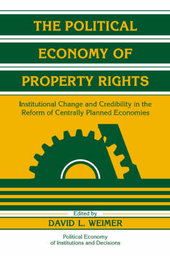
|
The Political Economy of Property Rights: Institutional Change and Credibility in the Reform of Centrally Planned Economies
Hardback
Main Details
| Title |
The Political Economy of Property Rights: Institutional Change and Credibility in the Reform of Centrally Planned Economies
|
| Authors and Contributors |
Edited by David L. Weimer
|
| Series | Political Economy of Institutions and Decisions |
|---|
| Physical Properties |
| Format:Hardback | | Pages:384 | | Dimensions(mm): Height 235,Width 158 |
|
| Category/Genre | Political economy |
|---|
| ISBN/Barcode |
9780521581011
|
| Classifications | Dewey:323.46 |
|---|
| Audience | | Professional & Vocational | |
|---|
|
Publishing Details |
| Publisher |
Cambridge University Press
|
| Imprint |
Cambridge University Press
|
| Publication Date |
13 April 1997 |
| Publication Country |
United Kingdom
|
Description
The Political Economy of Property Rights investigates the transformation of property rights in post-communist countries and China. The movement to effective market economies requires the creation of more effective supporting institutions, especially systems of property rights that decentralize the control of economic resources. This process is inherently political, and thus should be studied from the perspective of political economy.
Reviews"...recommended to anyone dealing with privatization strategies in the transformation economies or with the political economy of institutional change." Thomas Wagner, Journal of Institutional & Theoretical Economics "...nothing could be more than a book on the interaction between the political insitutions of democracy and economic transformation. IThe Political Economy of Property Rights was the result of comparative studies made by the respective country specialists." Slavic Reviews "This volume examines why the countries have followed the policy courses that they did. Weimer describes the basic principles of property rights, in particular, security against appropriation by others, emphasizes the close connection between private property and democracy, and then summarizes the other contributions. ...a major step toward developing such a full model, as it confronts the modesl with many empirical cases. We can then see what data and techiniques are most successful in testin the theory." Kenneth Koford, Journal of Comparative Economics
|